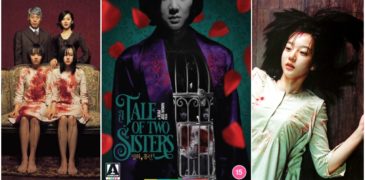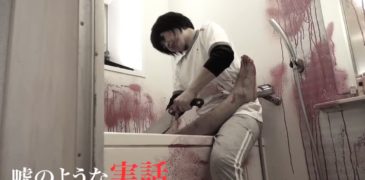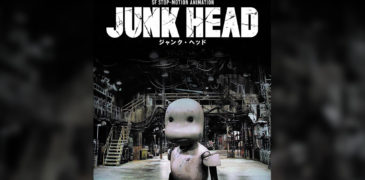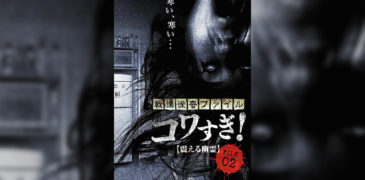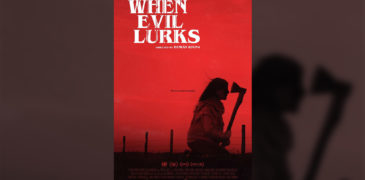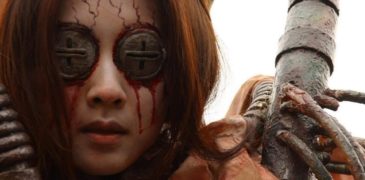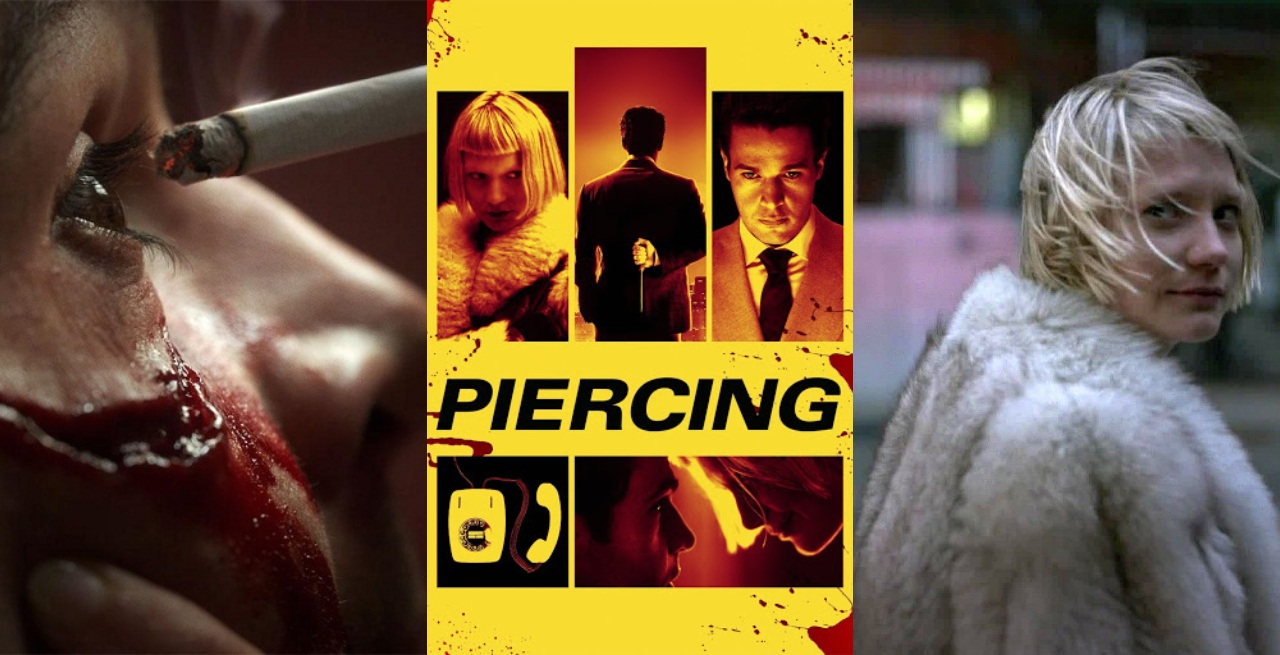
Book-to-film adaptations often get a bad rap. It’s rare for them to truly satisfy the audience, and they hardly ever live up to the expectations of the fans of the original material. When it comes to Japanese works adapted by Western directors, the situation usually takes a nosedive. They tend to prioritize making the content more digestible rather than capturing the essence of what made the original work fantastic. But every once in a blue moon, something extraordinary happens. A director steps up, takes on one of the most raw and visceral pieces of contemporary Japanese literature, and adapts it in all its gritty glory. Nicholas Pesce’s film Piercing (2018) is definitely an example of this anomaly. Disturbing, gory, and often filled with dark humor, this film will hit a nerve in the most skeptical and jaded horror enthusiasts, just like the book did.
What’s Piercing (2018) about?
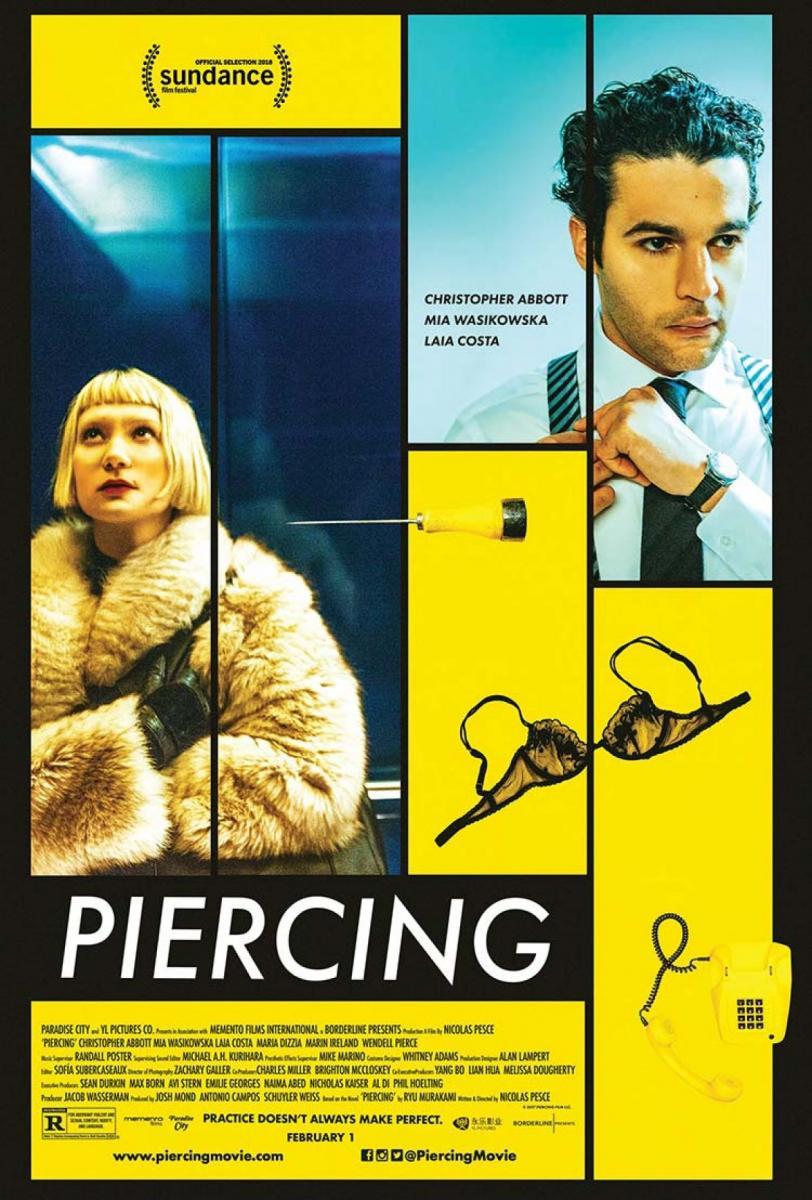
Following closely Ryu Murakami’s book of the same name, Piercing (2018) tells the story of Reed (Christopher Abbott), a young father overwhelmed by the desire to stab his infant daughter with an icepick. Despite his love for his baby and his wife, Mona, Reed is aware that his traumatic past is manifesting through this intrusive thought. Fearing he might act on his impulses, he decides to confront his urge. Under the pretext of a work trip, he checks into a hotel and meticulously plans to murder a prostitute with an icepick.
Unfortunately for him, nothing goes as expected when the escort agency sends Jackie (Mia Wasikowska), an unstable woman with a penchant for self-harm. After a first bad encounter and a violent incident in the hotel’s bathroom, Reed and Jackie’s lives become intertwined one fateful night, an ironic twist resulting from their mutual misinterpretation of each other’s intentions. Reed believes Jackie is so suicidal that she doesn’t mind if he kills her, while she perceives Reed’s solemnity as a manifestation of love. Of course, that is not the case, and once that becomes clear, things will not end well for any of them.
Is It good?

One of the most distinctive features of Ryu Murakami’s body of work is his fearless exploration of the darkest corners of humanity; he doesn’t shy away from disturbing and uncomfortable subjects. Given that this element is fundamental to his style, an adaptation of a book like “Piercing” wouldn’t work unless you fully embrace these themes.
Fortunately, Pesce seems to be fully aware of this and goes all in. The fact that this isn’t a mainstream film grants him the freedom to delve into the depths of Jackie’s self-destructive behavior and, more importantly, explore how Reed became the man he is. The glimpses into his past and how they manifest on a subconscious level are one of the film’s highlights. They are so immersive and nightmarish that they will undoubtedly leave a lasting impression, even on the most seasoned horror fan.
As for the technical aspects of the film, the cinematography is absolutely stunning. Pesce chooses to set the story in an undefined North American city instead of Tokyo, as in the original. However, he manages to uplift the visual narrative, capturing the eerie atmosphere of the plot by using saturated colors and music. Surely taking inspiration of the giallo aesthetics, the setting adds more intensity to an already tense story.
Finally, it’s worth mentioning how great the cast is. Christopher Abbott and Mia Wasikowska, portraying Reed and Jackie respectively, create a dynamic that could at times be defined as the most messed-up rom-com couple. Despite the circumstances, they can be sweet and awkward with each other to the point that you almost forget what kind of movie this is. Laia Acosta as Mona also deserves recognition. Although most of what we see of her is Reed’s mental rendition, she manages to deliver one of the most demented exchanges in the film while still maintaining a sweet and maternal demeanor. That’s truly an accomplishment.
Final thoughts
While Piercing (2018) takes some creative liberties with the original material, it’s hard to see how that could bother even the most die-hard Ryu Murakami fan. The final product clearly respected his work, but at the same time, it did not feel like a mere copy. Pesce was smart enough to decide where to remain faithful to the source material but also when he could inject his personal style. In retrospect, that decision it is what was missing in many terrible Western adaptations of Japanese works.
Instead of being afraid of hurting the sensitivities of the audience, Pesce’s bold approach not only revitalized the story for existing fans but also made it accessible and engaging for newcomers, bridging the gap between cultures and showcasing the universal and gory themes of the tale. In the end, Piercing stands as a testament to the power of thoughtful adaptation, proving that honoring the source material doesn’t mean sacrificing originality but can, in fact, enhance the overall cinematic experience.

More Film Reviews
Tale of Two Sisters Movie Review – Classic K-Horror Film Gets Arrow Video Release
Konnichiwa! Dia Duit! Yo Yo Yo! Straight Outta Kanto here welcoming you all aboard the Nostalgia Train. I’ve said it before and I’ll say it again, the early noughties was,…
Eri’s Murder Diary Film Review – The Broken Mind Of A Killer
Proposing itself as an intimate look at a killer, Eri’s Murder Diary caught my attention among the many titles at Japan Film Fest Hamburg. Directed by newcomer Koji Degura, I…
Junk Head (2017) Film Review – Superb Stop-Motion Cinema
Junk Head is a 2017 dystopian stop-motion animation film, written and directed by Takahide Hori. The film is based on the director’s 2013 first short film Junk Head 1, whose…
Senritsu Kaiki File Kowasugi File 02: Shivering Ghost (2012) Film Review – You’ll never guess what happens next
After File 01 went off with a bang, Koji Shiraishi’s Senritsu Kaiki File Kowasugi! File 02: Shivering Ghost (2012) tries something different and turns out unexpectedly good. The first…
When Evil Lurks (2023) Film Review – A New Take on Possession
In recent years, foreign films have taken the horror genre by storm with such titles as Parasite (2019), Raw (2016), and Veronica (2017). The Argentinian director Demián Rugna‘s 2023 film,…
Meatball Machine (2005) Movie Review: Terracotta Special Edition Blu-Ray
One of the many perks of Blu-Ray re-releases is the granted ability to revisit a film that you otherwise might not have, or in some cases, the chance to check…
Hi everyone! I am Javi from the distant land of Santiago, Chile. I grew up watching horror movies on VHS tapes and cable reruns thanks to my cousins. While they kinda moved on from the genre, I am here writing about it almost daily. When I am not doing that, I enjoy reading, drawing, and collecting cute plushies (you have to balance things out. Right?)
